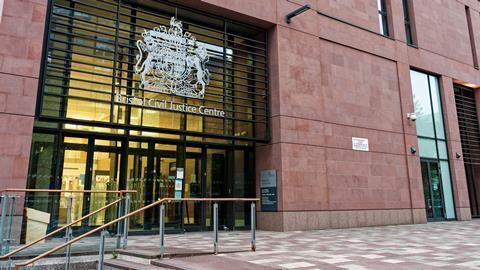A High Court judge has pleaded with litigants in person to find a lawyer after a catalogue of mistakes put their civil action on the brink.
His Honour Judge Paul Matthews gave John and Jennifer Greenwood ‘one last chance’ to comply with court rules and said they risk their claims being struck out automatically.
The couple had been required by the court to provide a transcript of the judgment they were seeking to appeal and to provide a service address in the UK. Neither requirement had been met and the judge ‘strongly urged’ the self-represented pair to obtain advice if they wanted to keep the case alive.
‘The law is not a game, and it involves both emotional and financial costs,’ said Matthews. ‘So far, it seems that the lack of legal advice has cost them dear. At the end of the day, of course, it is a matter for them. I cannot make them follow the rules. But, if they do not, they must accept the consequences.’
The Greenwoods made a statutory demand for £1.4m over a business dispute with Ronald Pringle which was set aside in September 2021 by Deputy District Judge Piddington. The judge also ordered the Greenwoods to pay £4,680 costs. It was not paid.
In mid-2022, the Greenwoods made an application for an order to ‘set aside Pringle’s claim’ and paid a £275 court fee. Matthews said it was not obvious what this meant as the Greenwoods were the claimants. ‘It seems that, as lay people, the Greenwoods did not understand the legal terminology,’ he added.
Last January, a different judge made the order for the Greenwoods to obtain and file the Piddington judgment and provide an address for service within the UK. No transcript has ever been lodged, with the Greenwoods saying it would be unnecessary and expensive.
The Greenwoods, who are resident in France, also rejected the UK service order, saying the only contact method should be email. Matthews stressed this requirement was not optional, adding: ‘The rule is not there for fun. It serves a serious purpose. In order for any legal process to be progressed efficiently and at the least cost.’
The court heard that the Greenwoods constantly referred in correspondence to a Latin maxim ex turpi causa non oritur actio, meaning ‘civil causes of action cannot be founded on a claimant’s own wrongdoing’. Matthews said the couple seemed to think this phrase represents ‘some kind of unanswerable argument’ as to why they should win without pleading their case and going through the usual litigation processes.
‘They need to understand that the maxim is nothing of the kind,’ he added.
‘No good reason has been shown for the breach. Being a litigant in person is not a good reason. Living abroad is not a good reason. Being elderly or impoverished are not in themselves good reasons.’
He gave the Greenwoods until 1 March to obtain the transcript and provide a UK service address. Only then would the court entertain their application for an extension of time.
This article is now closed for comment.




























16 Readers' comments